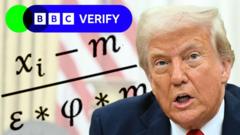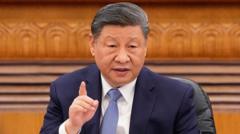International trade communities caution against escalating tensions while contemplating mutual concessions.
**Global Economies Unite Against Trump's Tariffs: A Path Forward?**

**Global Economies Unite Against Trump's Tariffs: A Path Forward?**
As President Trump's tariffs shake the markets, nations rally to respond strategically.
On April 3, 2025, global financial markets felt the immediate impact of President Trump’s extensive new tariffs. The levies, deemed counterproductive by many, forced various economies to swiftly reassess their trade strategies and realm of exports, heightening fears of a global trade “liberation day” turning into an “inflation day.”
Stock prices plummeted sharply immediately following the announcement, which proposed aggressive tariffs on a range of goods from several countries including China, the European Union, Japan, and others. China, facing a staggering 34% tariff on its goods, reacted vehemently, indicating that it would take necessary countermeasures to protect its economic interests, depicting the U.S. move as "bullying."
European leaders echoed similar sentiments, with Ursula von der Leyen, the president of the European Commission, promising unity in response to these tariffs. She emphasized the need for a collaborative approach, stating that “if you take on one of us, you take on all of us.” Furthermore, the response from Japan was described as cautious, with officials classifying the tariffs as “extremely regrettable,” signaling a reluctance to engage in tit-for-tat responses.
The economic parallels were unmistakable within the regions; as tariffs mounted against imports from the EU and China, reactions in stock markets were dramatically negative. The S&P 500 futures dropped by over 3%, reflecting investor anxiety regarding the impending economic repercussions, particularly for industries heavily reliant on imports.
German officials were among the most outspoken, expressing concerns that these tariffs posed a significant risk to Germany's economy, currently projected for only a 0.3% growth this year. Finance Minister Jörg Kukies stressed the importance of a strategic response to Washington, while economists noted that the unpredictability of Trump's tariffs could destabilize industries attempting to adapt to the new economic landscape.
Even as Trump shielding the tariffs under the guise of enhancing domestic production, critics within the U.S., including business groups and lawmakers, universally denounced the tariffs and their expected impact on consumers, foreshadowing potential price hikes in numerous sectors. Eswar Prasad, a Cornell University trade expert, emphasized that rather than fixing trade rules, Trump risked dismantling the established systems governing international commerce.
Additionally, recent reports revealed that tariffs would be imposed on numerous other countries, creating a universally hostile climate shocking to long-time trade relationships. Countries like Vietnam saw tariffs exceeding 40%, warning that the ramifications would extend far beyond individual markets to impact global trade norms significantly.
As global leaders weighed their responses, many recognized the necessity for measured but firm actions, anticipating negotiations as a path to mitigate the impacts without engaging in a trade war. In contrast, smaller economies and nations reliant on exports voiced fears of long-term damage, reminding the world that the cost of these tariffs could potentially backfire on the American consumer.
As the situation continues to evolve, eyes remain fixed on potential retaliatory measures from the international community and discussion of new strategies that may arise from this escalating situation, reflecting a global economy that will need to find balance amid shifting trade dynamics.
Stock prices plummeted sharply immediately following the announcement, which proposed aggressive tariffs on a range of goods from several countries including China, the European Union, Japan, and others. China, facing a staggering 34% tariff on its goods, reacted vehemently, indicating that it would take necessary countermeasures to protect its economic interests, depicting the U.S. move as "bullying."
European leaders echoed similar sentiments, with Ursula von der Leyen, the president of the European Commission, promising unity in response to these tariffs. She emphasized the need for a collaborative approach, stating that “if you take on one of us, you take on all of us.” Furthermore, the response from Japan was described as cautious, with officials classifying the tariffs as “extremely regrettable,” signaling a reluctance to engage in tit-for-tat responses.
The economic parallels were unmistakable within the regions; as tariffs mounted against imports from the EU and China, reactions in stock markets were dramatically negative. The S&P 500 futures dropped by over 3%, reflecting investor anxiety regarding the impending economic repercussions, particularly for industries heavily reliant on imports.
German officials were among the most outspoken, expressing concerns that these tariffs posed a significant risk to Germany's economy, currently projected for only a 0.3% growth this year. Finance Minister Jörg Kukies stressed the importance of a strategic response to Washington, while economists noted that the unpredictability of Trump's tariffs could destabilize industries attempting to adapt to the new economic landscape.
Even as Trump shielding the tariffs under the guise of enhancing domestic production, critics within the U.S., including business groups and lawmakers, universally denounced the tariffs and their expected impact on consumers, foreshadowing potential price hikes in numerous sectors. Eswar Prasad, a Cornell University trade expert, emphasized that rather than fixing trade rules, Trump risked dismantling the established systems governing international commerce.
Additionally, recent reports revealed that tariffs would be imposed on numerous other countries, creating a universally hostile climate shocking to long-time trade relationships. Countries like Vietnam saw tariffs exceeding 40%, warning that the ramifications would extend far beyond individual markets to impact global trade norms significantly.
As global leaders weighed their responses, many recognized the necessity for measured but firm actions, anticipating negotiations as a path to mitigate the impacts without engaging in a trade war. In contrast, smaller economies and nations reliant on exports voiced fears of long-term damage, reminding the world that the cost of these tariffs could potentially backfire on the American consumer.
As the situation continues to evolve, eyes remain fixed on potential retaliatory measures from the international community and discussion of new strategies that may arise from this escalating situation, reflecting a global economy that will need to find balance amid shifting trade dynamics.




















